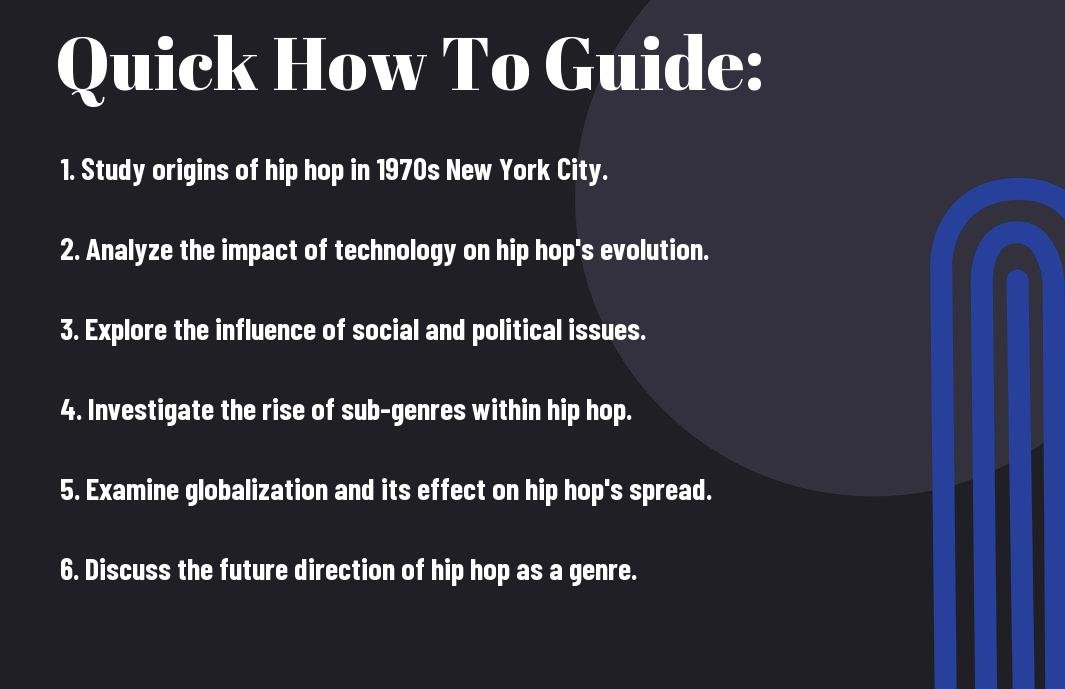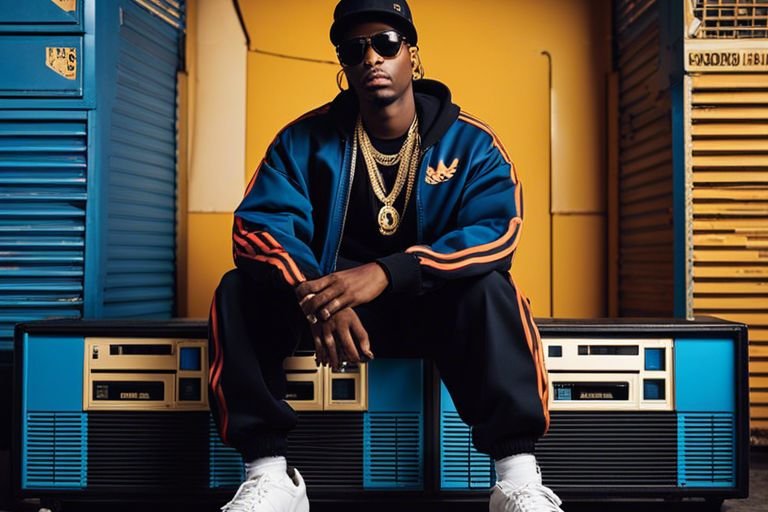Ruminating on the metamorphosis of hip hop over the years never fails to incite both nostalgia and a sense of wonder at the sheer ingenuity and resilience of this musical genre. From its humble beginnings in the Bronx to its ubiquitous presence in global popular culture, hip hop has undergone a series of radical transformations that have shaped not only the music industry, but also social and political landscapes. In this blog post, I will delve into the evolution of hip hop, exploring the most significant changes and their impact on the genre’s sonic and cultural identity.
Key Takeaways:
- Diversity in Style: Hip hop has evolved to encompass a wide range of styles, from its roots in the Bronx in the 1970s to the more contemporary sounds of trap and mumble rap.
- Social and Political Influence: The genre has been a vehicle for addressing social and political issues, serving as a platform for artists to speak out on topics such as racial inequality and police brutality.
- Mainstream Acceptance: Hip hop has transcended its origins to become a global phenomenon, with artists achieving mainstream success and influencing popular culture across the world.
- Technological Advances: The digital age has played a significant role in shaping the evolution of hip hop, from the production of beats to the distribution of music through streaming platforms and social media.
- Commercialization and Criticism: While hip hop has achieved commercial success, it has also faced criticism for promoting materialism and negative stereotypes, sparking debates about the direction of the genre.
The Roots of Hip Hop
As a hip hop historian, I have spent years researching the evolution of this influential musical genre. From its early days in the Bronx to its global domination, hip hop has undergone significant changes. To truly understand where hip hop is today, it is essential to delve into its roots and explore how it all began.
The Birth of Hip Hop in the 1970s
A pivotal moment in the history of hip hop occurred in the 1970s in the South Bronx, New York. It was a time of social and economic struggle, and music became an outlet for the expression of the frustrations and aspirations of the Black and Latino communities. This gave birth to a new form of artistic expression that would soon be known as hip hop. It was in this environment that DJs began experimenting with mixing and blending records, creating a new sound that would become the backbone of hip hop music. This era also saw the emergence of MCs and rappers, who would use their lyrical skills to convey powerful messages and tell stories that resonated with their audience.
Influences and Early Pioneers
Hip hop was not created in a vacuum. It was heavily influenced by the music, art, and social movements of the time. The rhythmic elements of funk, soul, and disco heavily influenced the creation of hip hop beats, while the poetic traditions of spoken word and storytelling provided the foundation for the lyrical content. Early pioneers such as DJ Kool Herc, Grandmaster Flash, and Afrika Bambaataa played a crucial role in shaping the sound and culture of hip hop. They introduced new DJ techniques, such as breakbeat mixing and scratching, which became cornerstones of hip hop music production. Their innovations laid the groundwork for the explosive growth and diversity of hip hop in the decades to come.
Evolution of Hip Hop Music
One of the most fascinating aspects of hip hop music is its evolution over time. From its origins in the Bronx in the 1970s to its current global dominance, hip hop has undergone significant changes in both its sound and its cultural impact. As a lifelong fan and student of the genre, I have witnessed firsthand the ways in which hip hop has transformed and adapted to the changing musical landscape.
Changes in Lyricism and Subject Matter
One of the most notable evolutions in hip hop music is the shift in lyricism and subject matter. In its early days, hip hop was largely focused on party anthems and social commentary. However, as the genre has matured, artists have begun to explore more complex and introspective themes in their music. This shift has led to a greater emphasis on storytelling and personal expression, as well as a wider range of topics being addressed in hip hop lyrics. From the dangers of street life to the positive impacts of self-empowerment and social change, hip hop has become a platform for artists to share their experiences and perspectives in a way that resonates with audiences around the world.
Impact of Technology and Production
Another significant factor in the evolution of hip hop music has been the impact of technology and production. With the rise of digital recording and production software, artists have been able to create music in ways that were once unimaginable. This has led to a more diverse range of sounds and styles within the genre, as well as the ability for independent artists to produce and distribute their music on a global scale. The accessibility of technology has democratized the production process, allowing for a greater diversity of voices and perspectives to be heard within hip hop.
Through these changes in lyrical content and production capabilities, hip hop has continued to grow and evolve, remaining one of the most influential and powerful musical genres in the world. As a fan and observer of this evolution, I am excited to see how hip hop continues to shape and reflect the cultural landscape in the years to come.
Commercialization and Popularity
Despite its origins as a grassroots movement in the streets of New York City, hip hop has experienced a tremendous surge in commercialization and popularity over the years. As the genre garnered mainstream attention, it transitioned from being an underground movement to a global musical phenomenon. This shift in popularity and acceptance brought about a number of changes to the genre and its cultural impact.
Mainstream Success and Crossover Appeal
Mainstream success has allowed hip hop to cross over into other musical genres and reach new audiences. With the rise of rap’s popularity, it has infiltrated pop, rock, and even electronic music. Hip hop collaborations with mainstream artists have become more common, further cementing its place in popular culture. This has led to an increase in influence and recognition for hip hop artists, paving the way for more opportunities and exposure for the genre as a whole.
Effects on Hip Hop Culture and Image
The increased commercialization of hip hop has had a significant impact on its culture and image. On one hand, it has allowed for greater financial success and visibility for artists within the hip hop community. However, it has also led to a dilution of the genre’s original message, with an emphasis on materialism and superficiality. This shift has sparked debates within the hip hop community about the authenticity and integrity of the music, as well as the portrayal of hip hop culture in mainstream media. It is important for artists to stay true to their roots while navigating the pressures of commercial success.
In the evolving landscape of hip hop, it is crucial to recognize both the positive and negative effects of commercialization and popularity. While the increased exposure has provided a platform for hip hop to reach new heights, it has also challenged the authenticity and core values of the genre. As a fan of hip hop, it is imperative to support artists who maintain a strong sense of integrity and continue to push the boundaries of the genre while staying true to its roots.

Conclusion
Ultimately, hip hop has undergone significant changes over time, evolving from its humble beginnings in the Bronx to a global phenomenon. The musical genre has not only transformed sonically, incorporating various sub-genres and influences, but has also expanded its cultural impact, shaping fashion, language, and social movements. As someone who has closely observed the evolution of hip hop, I can confidently say that its ability to adapt and innovate has been crucial to its longevity and relevance. From its emphasis on storytelling and social commentary to its experimentation with new sounds and production techniques, hip hop continues to push boundaries and defy expectations. The future of hip hop remains unpredictable, but one thing is for certain – its evolution is far from over.
FAQ – Evolution of Hip Hop
Q: What are the origins of hip hop?
A: Hip hop originated in the Bronx in the 1970s, arising from the urban culture and the creativity of African American and Latino youth. It began as a form of expression through music, dance, and art, and was born out of the social and economic struggles of that time.
Q: How has hip hop music evolved over the years?
A: Hip hop has evolved significantly since its inception, with the emergence of various subgenres such as gangsta rap, conscious rap, and mumble rap. It has also incorporated elements of rock, electronic, and pop music, leading to a diverse and dynamic sound.
Q: How has hip hop influenced popular culture?
A: Hip hop has had a profound impact on popular culture, influencing fashion, language, and art. It has also played a significant role in social and political movements, serving as a platform for addressing issues such as racism, inequality, and police brutality.
Q: What role has hip hop played in the music industry?
A: Hip hop has become one of the dominant genres in the music industry, continuously breaking records and earning critical acclaim. It has produced numerous successful artists and has expanded its reach globally, making it a powerhouse in the entertainment world.
Q: What is the future of hip hop?
A: The future of hip hop looks promising, as it continues to evolve and adapt to the changing times. With the rise of digital platforms and streaming services, hip hop has found new ways to connect with audiences and push creative boundaries. It is expected to remain a driving force in music and culture for years to come.




